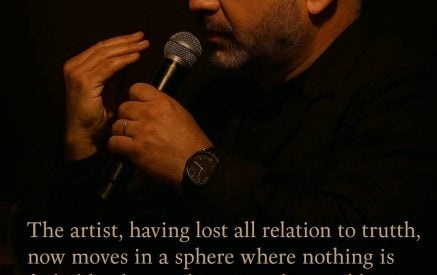Zygmunt Bauman, commenting on Michel Houellebecq’s novel “The Possibility of an Island,” singled out this novel of warning as a genuine dystopia of our time which exposes our frame of mind with its insecurities, phobias, and discontents. Most telling was his emphasis on what he described as a new sense of fatalism, powerlessness and helplessness in the face of the new pattern of technology and politics, the latter being merely a derivative and subordinate of the former.
The blind leading the impotent – this is Bauman’s metaphor which addresses, with a stroke of genius, the issue of the divorce of politics and power. In the past, politics was all about goals, directions, ethical concepts, visions, and objectives, which were indispensable for a blueprint of a viable social and moral order. Power served to politics as instruments to achieve these goals and to implement the visions, thus living up to the expectations of the political class and citizens. From now on, their paths diverged.
The individual is expected to become a parliament, a government, a corporate world, and an army for him or herself, since no public body assumes responsibility for the future nowadays. We are left to our own devices for the sake of our freedom and autonomy, which are quickly forgotten when it comes to taxes, bad biographies and skeletons in our closets for the purpose of blackmailing and silencing us, not to mention mass surveillance and daily violations of our privacy.
We are all uniquely free insofar as the state has no policy to sustain the public good or education – the paradise ends as soon as we start criticizing public bodies and undermining their legitimacy and prestige. This is to say that we are all individuals by decree when the state is idle or morally and politically bankrupt, as Bauman would have it. Yet what lurks behind his wise, albeit caustic, words is a clear sense that no particular individual can assume responsibility for the socially and globally produced problems. We deceive ourselves by taking things otherwise.
The blind leading the impotent, according to Bauman as yet applied to Houellebecq. Yet I am tempted to apply a classical metaphor based on an old fable as seen in a classical painting of the genius of Brussels, Pieter Bruegel the Elder. The Blind Leading the Blind is a masterpiece of a great Flemish master which hangs in Museo di Capodimonte at Naples, Italy. The painting is based upon a saying of Jesus that appears in the Gospels: “Can the blind lead the blind? Will they not both fall into the ditch?”
The painting represents the world of a grim Renaissance parable. Several blind men stumble and fall. Since none has vision, they can only rely on a sense of their fellowship and also on the indivisibility of the group. Yes, but the question remains as to what if the one who leads the group has no visual grasp of reality either? What if he is blind himself?
If so, the question arises, what is the meaning of being in charge of the group of the blind if you are blind as well? A sincere belief that anything is so makes it so, as William Blake would have it? Sweet lies and self-deception? If we are to believe a legend, the one who was responsible for the group had a minimal power of visual grasp of the world around him. It could have been that public authorities or guards of the town had more respect for the one who was in the lead and who, therefore, could represent the group. A good reason to conceal your blindness and pretend that you can see a bit.
Pieter Bruegel the Elder’s moralizing painting leaves no shadow of a doubt as to whether the blind who leads the blind can see. Of course, he cannot. As the allegory suggests, our arrogance is a loyal sister to our folly and stupidity, for how can we rely on ourselves when we have no faith; nor do we have any moral guidance. A world devoid of criteria is quick to judge. The more uncertain we are about ourselves, the stronger our resolve about the others. The more insecure we are at home, the more frenzy will be in our attempt to provide security for the rest of the world.
This reminds me of our patronizing attitude to the Eastern partnership countries. We seem to export democracy and human rights ideology, yet we fail to notice somehow that democracy is not doing well in the EU itself. It had long been unwell in Hungary, and now it seems to have gone for a long summer vacation in Romania. The most primitive concept of democracy, according to which it suffices to have 50 + 1 percent to pass for a legitimate democratic power, helped bulldoze the way toward what appears as a silent coup d’etat in Romania.
There is so much sound and fury each time when it comes to our support of and confidence in Georgia and Azerbaijan as countries opposed to Russia, yet our anti-Putinism, no matter how just, well-grounded, and logical, cannot become a license for Mikhail Saakashvili to kill democracy in Georgia; nor can it serve as an absolution from all sins for Ilham Aliyev, who is responsible for a regrettable human rights record of Azerbaijan.
No matter how passionately we wish well to Ukraine and Moldova, we cannot turn a blind eye to what is happening there in terms of corruption. Even if we admire Armenia, we cannot ignore the deteriorating situation of civil liberties and justice there. The fact that Rector of Yerevan State University after Valery Brusov, Professor Suren Zolyan, a world class scholar, was sacked by his ministry for political reasons, says something disturbing about our friend and partner.
And we cannot keep our eyes wide shut. Because the blind cannot lead the blind.
Leonidas Donskis, Ph.D., is a Lithuanian Member of the European Parliament.
© 2012 The Baltic times. All rights reserved.
























































